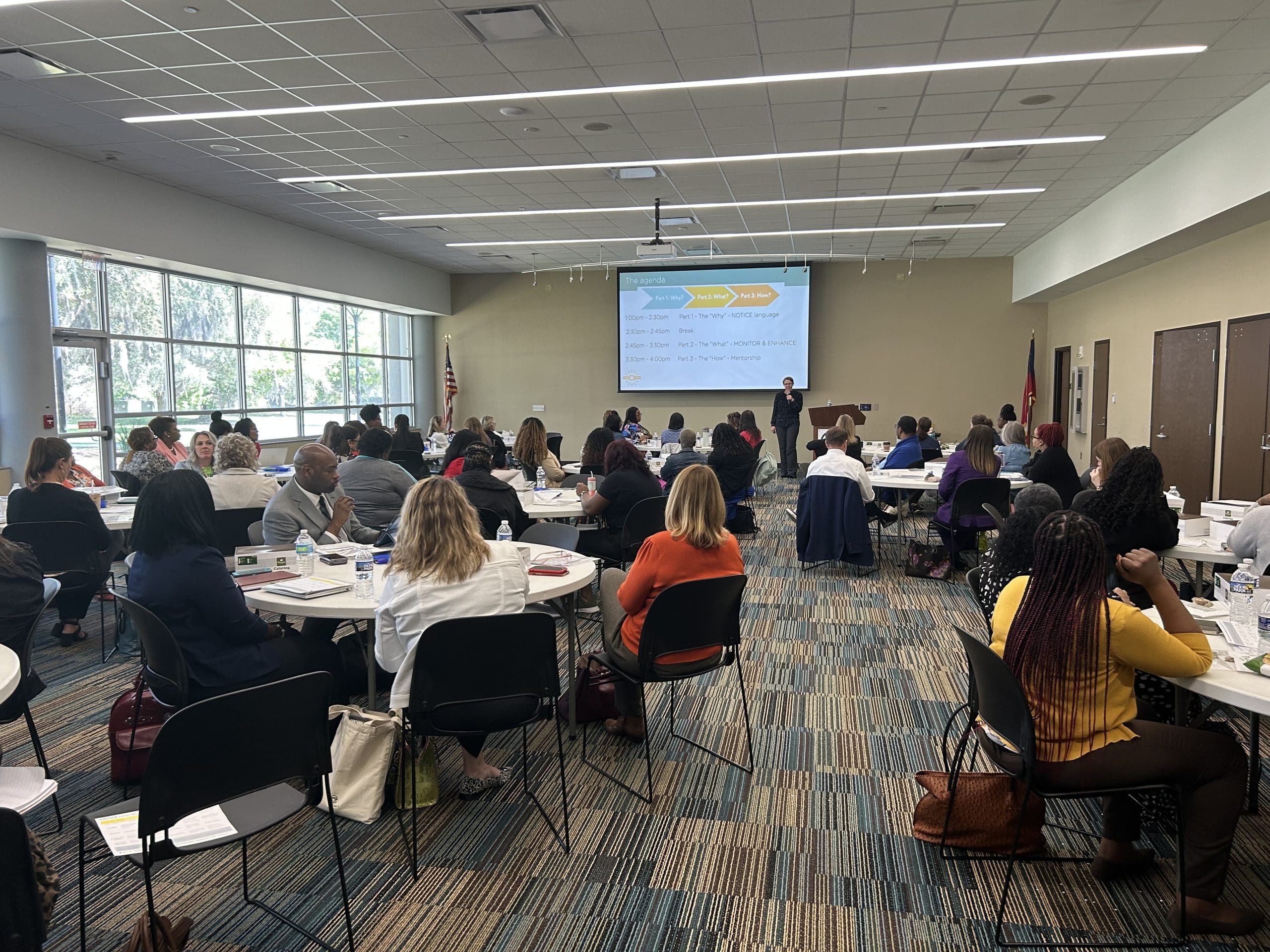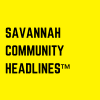(SAVANNAH, Ga.) Active classroom engagement is at the heart of children’s learning. Teachers need to be equipped with suitable tools to support student acquisition of skills that build healthy peer relationships and regulate emotions while also ensuring that classroom diversity translates into successful social inclusion and student learning.

These were the findings of a Marcus Foundation-funded 2022 study of teachers’ experiences and perceived effects of a professional development approach called Social Emotional Engagement – Knowledge and Skills (SEE-KS). The approach aims to incorporate support for teachers to help them meet the diverse social-emotional and academic needs of their students.
Co-developer of the SEE-KS approach, national early language and literacy expert Emily Rubin returned to Savannah on March 7 to lead a second training session with local educators and provide freely accessible tools for measuring learner engagement, enhancing engagement in everyday settings and academic instruction, and empowering educators to sustain the work through peer to peer mentorship.
About 75 local educators attended the training, presented by Coastal Georgia Indicators Coalition, United Way of the Coastal Empire and the Savannah Chatham County Public School System.
Held at the Southwest Branch of Live Oak Public Libraries, the event was the second of a series of three sessions to be led by Rubin for Savannah area educators. During the first, held on January 11, Rubin provided a tool kit for educators to help identify early indicators of language and how to interact with children to help with their communications.
“Our focus in this second session was to provide support for the development of community-viable models of staff training,” Rubin said. “We shared the tools that build the capacity of school systems and early intervention providers to serve as informed consumers of evidence-based practices.”
Rubin said her professional vision is to empower our public schools with a framework for social and emotional engagement and learning that is: 1) ecologically valid to the demands of achieving academic standards, 2) sensitive to the unique needs of students with social learning differences, and 3) can serve as a universal design for learning that benefits all of our students and young children in order to maximize return on professional learning.
“This training opportunity offered teachers the tools they need to mentor other teachers in early intervention techniques,” said CGIC executive director Lizann Roberts. “Its purpose was to build their skillsets and model how they can work together to foster the social and emotional and academic needs of their students.”
ABOUT SPEAKER EMILY RUBIN, MS, CCC-SLP
Emily Rubin, MS, CCC-SLP is the Director of Communication Crossroads, Inc. in Decatur, GA. She is a speech-language pathologist specializing in social emotional engagement and its relationship with language development, learning and positive outcomes. As a former adjunct faculty member and lecturer at Yale University, she served as a member of their Autism and Developmental Disabilities Clinic. She has also served as an instructor for the Communication Sciences and Disorders Department of Emerson College in Boston, Massachusetts where she has developed courses to prepare graduate level students for addressing the needs of children with autism and their families. She participated as a member of the American Speech-Language-Hearing Association’s Ad Hoc Committee on Autism Spectrum Disorders (ASD), a committee charged with developing guidelines related to the role of speech-language pathologists in the diagnosis, assessment, and treatment of ASD.
Rubin’s publications have focused on early identification of autism, contemporary intervention models, and programming guidelines focused on the social emotional engagement of all learners. She is a co-developer of the Social Emotional Engagement – Knowledge and Skills (SEE-KS) professional learning approach, an approach that provides freely accessible tools for measuring learner engagement, enhancing engagement in everyday settings and academic instruction, and empowering educators to sustain the work through peer to peer mentorship.
Rubin provides support for the development of community viable models of staff training. Her focus is on building the capacity of school systems and early intervention providers to serve as informed consumers of evidence-based practices. Emily’s professional vision is to empower our public schools with a framework for social emotional engagement and learning that is: 1) ecologically valid to the demands of achieving academic standards, 2) sensitive to the unique needs of students with social learning differences, and 3) can serve as a universal design for learning that benefits all of our students and young children in order to maximize return on professional learning.
SPONSORED BY:
Corporate sponsorship for this training is provided by Gulfstream Aerospace Corporation and St. Thomas Thrift Store.
EVENT PARTNERS: Coastal Georgia Indicators Coalition, United Way of the Coastal Empire, Live Oak Public Libraries, Get Georgia Reading, Sandra Dunagan Deal Center for Early Language and Literacy and Savannah Chatham Public School System.
ABOUT EVENT PARTNERS AND SPONSORS
Emily Rubin https://scerts.com/emily-rubin-ms-ccc-slp/
Get Ga Reading https://getgeorgiareading.org/
Deal Center https://www.galiteracycenter.org/
CGIC: https://www.coastalgaindicators.org
St Thomas Thrift Store Facebook: https://www.facebook.com/StThomasThriftStore
UWCE: https://uwce.org
SCCPSS: https://spwww.sccpss.com/Pages/default.aspx
ABOUT COASTAL GEORGIA INDICATORS COALITION
The Coastal Georgia Indicators Coalition (CGIC) is comprised of community members and advocates working together through a comprehensive coordinated approach for planning accountability. It serves as a collaboration of resource agencies addressing overall health and well-being while leveraging resource initiatives. The purpose of the Coalition is to improve community well-being by engaging and leading the community to work collectively in its development of strategic priorities that guide policy, programs and resource allocation. CGIC is the responsible organization for the development, and with partners, the implementation of the Chatham Community Blueprint. CGIC has strength and capacity related to leadership, management, systems and partnerships.
https://www.coastalgaindicators.org
ABOUT UNITED WAY OF THE COASTAL EMPIRE
The mission of the United Way of the Coastal Empire is to improve lives by mobilizing the caring power of community. The nonprofit organization provides a safety net for the most vulnerable and pathways for upward mobility so everyone in Bryan, Chatham, Effingham, and Liberty counties thrive. With upward mobility in mind, United Way of the Coastal Empire intends to help build a ready & resilient workforce and a better future for our youngest citizens through READ UNITED, a year-round series of early language and literacy development programs, and strategic partnerships to support SCCPSS and all school systems in their four-county service area. For more information, please visit www.uwce.org.
MEDIA CONTACT
Marjorie Young
Carriage Trade Public Relations® Inc.
912-844-9990
marjorie@carriagetradepr.com
